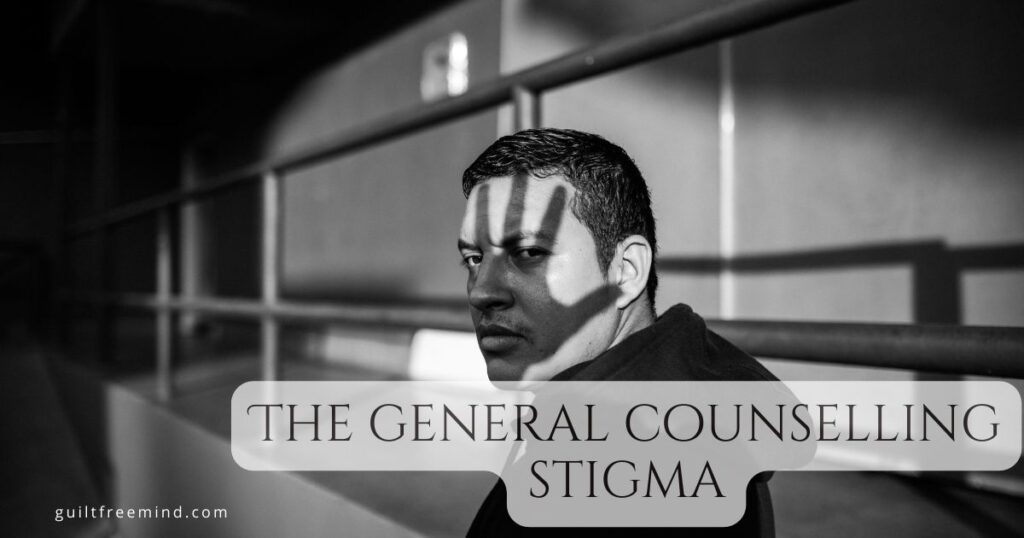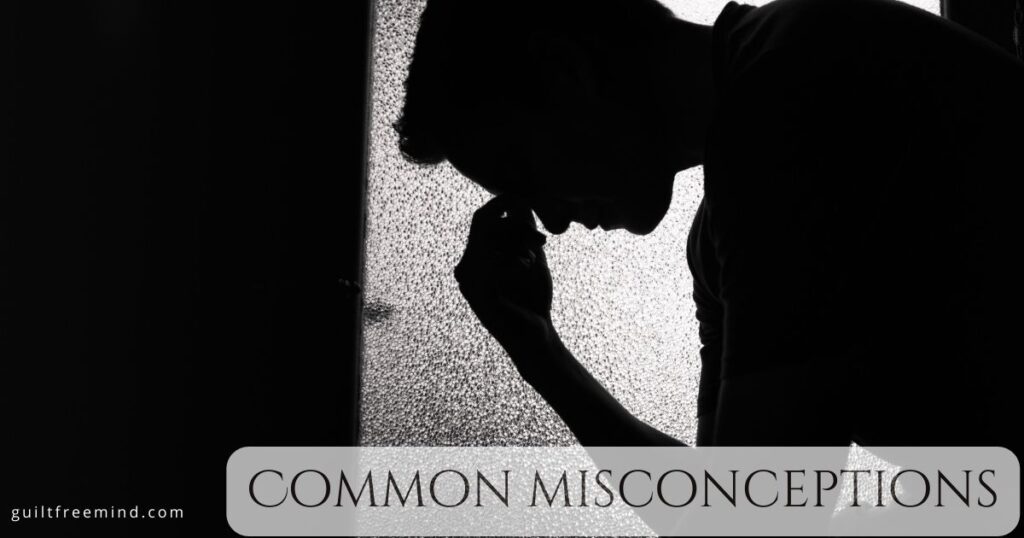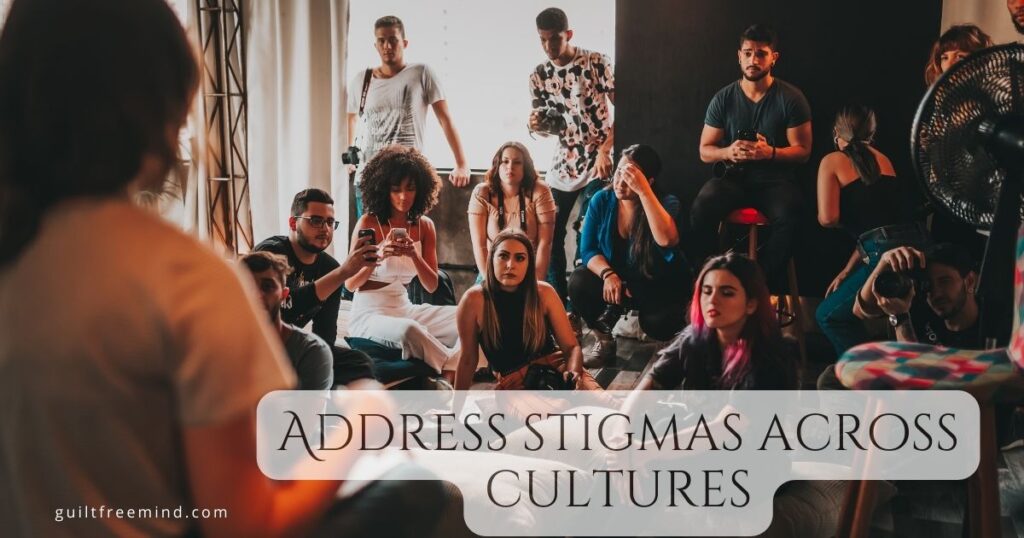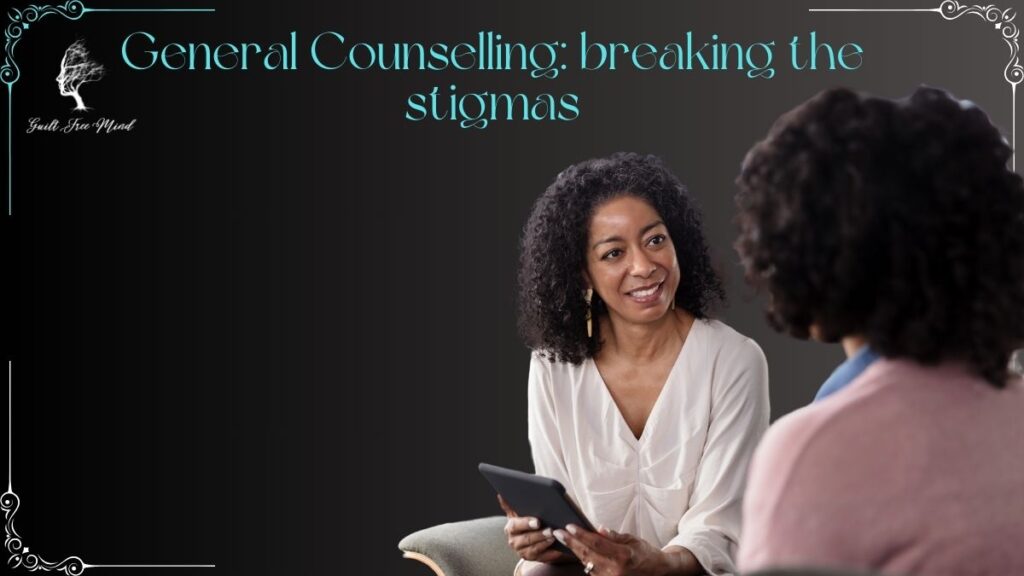It is time that mental health moves out of the shadows and into the light. We are all struggling. Plastering a smile on your face and saying “everything is alright’ ‘is okay for assuring your loved ones. However, lying to yourself is not a solution. You deserve better and you should be able to reach out and get it. This has made it essential that the need for mental health help is brought forward and into the light. Thus it has become crucial that the stigma about general counseling is removed as soon as possible.
Table of Contents
The General Counseling stigma
Even if you breathe a word about opting for general counseling, the first thing that others will tell you is:
- You don’t need it.
- This is just a phase. It will pass.
- You don’t need to go to a shrink. Only mad people go there.
Due to this misunderstanding and the weight of social judgment surrounding mental health issues, people prefer to be silent about their mental health struggles and suffer in silence. The gossipmonger and misunderstood folk have made it difficult for those who need help to reach out for it and lead a positive and fulfilling life.

When a dialogue about mental health is initiated, the walls of stigma around it can be abolished. We can bring in acceptance, warmth, and an unbiased acceptance of everyone. Openness empowers everyone to feel empowered, share their hardships and fears without worrying about judgment and successfully proceed on the journey of growth and better mental health.
If you wish to lead a more positive and fulfilling life, subscribe to Guilt free Mind. The subscription option is present in the sidebar. If you like watching videos, subscribe to the YouTube channel of Guilt Free Mind. Do not forget to ring the notification bell, and set it to ALL, this way, YouTube will never miss notifying you about any new releases from the channel.
Before I discuss why one should seek general counseling, let’s understand the stigmas related to mental health that keep people from seeking help.
Understanding the mental health stigma.
Mental health is covered with a common landscape of stigmas. There are too many stereotypes and stigmas when it comes to asking for help. Let’s see how these stigmas act as deterrents and dissuade those who desperately need help from getting what they rightfully deserve.
Common misconceptions regarding general counseling
The mental health world is shrouded in misconceptions, misunderstandings, and stereotypes. Societal norms, media portrayal, and historical biases, all have played a major role in fueling the fire against mental health help and general counseling. The most common misconceptions regarding mental health are:
- Asking for help regarding mental health is a sign of weakness
- If you are struggling with mental health, you are a failure as a person.
- General counseling should only be opted for if you are stuck in severe mental health issues and cannot go about your daily life at all.
As a responsible individual, it is our responsibility to dispel these myths and pave the way for people to know the truth from false information.
The general counseling stigma acts as a deterrent
The societal stigma associated with general counseling acts as a huge deterrent for most people. The fear of discrimination and judgment outweighs the need for general counseling. The hold of fear in such individuals is so strong that they prefer to suffer in silence instead of working towards a better future. Society expects people to be resilient and fight their mental health battles on their own without help from internal sources. This causes people to get trapped in a vicious cycle of self-doubt and secrecy,
Direct effect on help-seeking attitude
Stigmas impact much more than just the perceptions of the person. They also have a huge impact on the help-seeking behavior of those who need help. Due to the fear of being misunderstood, labeled as outcasts, or ostracized from society, such people find themselves stuck in a conundrum of ‘Should I?’. This fear and hesitation delay the individual from reaching out on time. This delay in turn exacerbates the already deteriorating mental health condition of the individual, further reducing the chances of quick and timely recovery. Understanding the impact of stigma on those seeking help is crucial to dismantling the miscommunication and fostering a culture of growth and recovery.

Break the silence
when the chains of stigma are broken, a fresh way is paved for positive attitudes and freeing the people to ask for the help they rightfully deserve. Dismantling of the stigma is crucial for the rise of a more empathetic and inclusive society. Let’s understand how a supportive environment can be created so that individuals can proceed on a journey of recovery and not silence.
Strength in seeking general counseling
In this section, I will discuss and dismantle the myths associated with general counseling. Let’s understand the power of understanding and acknowledging one’s mental health struggles. Society must acknowledge that asking for help is not an act of cowardice. It is instead an act of courage and bravery.
Debunking the myths about vulnerability
This society looks at vulnerability as a weakness. The unfortunate part is that mental health also suffers the same stigma. Anyone who seeks general counseling is labeled as being weak. Acknowledging one’s difficulty takes a lot of courage. It should be viewed as a sign of immense strength and not weakness. Asking for help and opting for general counseling hints towards the presence of resilience. Such people wish to move forward and lead a positive and fulfilling life instead of hiding in the shadows and struggling with their mental health issues. Asking for help is a sign of commitment toward personal growth.
General counseling leads to empowerment
Opting for general counseling can empower and make you strong. Counseling allows you to harness your inner strength and makes you stronger to bear challenges, explore traumas, and develop coping mechanisms for the future. General counseling provides a safe environment where the person can explore their thoughts, feelings, and emotions, which in turn allows them to empower themselves to easily navigate difficult life situations.
Courageous decision-making process
It takes a whole lot of courage to confront your problems and vulnerabilities. The first step in getting help is to ask for it. Asking for help is one of the hardest things you will do. Once you ask for help, you have already taken your first step towards better mental health. This promotes a narrative where you start to celebrate your bravery in asking for support.

Seeking help is not a weakness
One of the most harmful stigmas that negatively affects a person from seeking general counseling is the stigma that asking for help means that you are a weak person. This acts as a huge hindrance to starting on a better mental health journey. We have to reframe this narrative so the stigma of weakness can be broken and a positive mental health attitude can be developed.
Journey of empowerment
Focus on the strength in seeking help. This will help reframe your entire counseling process and make it an empowering journey for the person. This helps you navigate your struggles by boosting your personal growth, handling your struggles with intentionality, and boosting your capacity to face the complexities of life.
Role of education in destigmatization of general counseling
Education has a huge role in acting as a catalyst to help destigmatize mental health issues. After all, knowledge is power. Educating people about the benefits of general counseling can promote an environment of empathy, understanding, and positivity. This type of culture will promote discussions about better mental health and well-being all around the globe and benefit everyone in the process.
Importance of mental health education
The reason mental health is shrouded in stigmas is because there is a huge lack of proper understanding of mental health. There are also too many misconceptions surrounding the same. When people are properly educated about mental health, these preconceived notions are challenged, their awareness of mental health increases and i. individuals feel safer in choosing their mental health. When the walls of ignorance wee broken down, you can focus on being more compassionate and inclusive.
Dispelling the myths
The most powerful tool against myths in any field is education. We must develop and promote accurate information about general counseling. When people understand the methods, benefits, and purpose of counseling, the demystification will make mental health more accessible and allow you to stop being resistant because the misconceptions have been eliminated.

Encouraging open-ended conversations
When mental health habits are boosted and promoted, it opens up the stage for open-ended conversations. This allows the discussion around emotional well-being and general counseling to be more normalized. When an open discussion about mental health is launched, people start to open up about their struggles and move forward to seek support without being afraid of judgment. This in turn allows for entire cultures to change around mental health and promotes more engaging conversations.
Early intervention
Currently, most people will think of opting for general counseling once their mental health has already gone down the drain and they are not able to find a way to pull themselves out of the problem. Instead of going to a therapist when there are no other choices if the same person goes to the therapist at the beginning of their mental health issue, they could easily keep the problem from escalating to such a high level.
People must be educated about their mental health challenges and the benefits of seeking help before the problem escalates to unmanageable levels. When people seek help, it boosts their mental strengths and empowers them to easily handle the situation if it becomes tougher. These forms of proactive engagement with mental health allow for early de-escalation of the problem and promote better mental well-being.
Develop a supportive community towards general counseling
Positive mental health education promotes the development of a mental health-supportive environment. when the common masses are well-educated about general counseling and mental health, they also contribute to the destigmatization process by sharing knowledge with those in their social circles. A community armed with knowledge has a higher chance of extending a helping hand full of empathy to those who might need it. They are more people ready to talk about mental health, provide support, and empathy, and work with others to break down the barriers of society regarding negative views towards general counseling.
Empowering individuals to proactively seek help
As education removes the stigma surrounding mental health, people who need help feel less resistance and can easily reach out. By empowering people with the knowledge of the different forms of counseling that are available, the variety of mental health resources, and how general counseling has helped people get back on their feet and lead a normal life, more people gain confidence and reach out when they need help.

Normalizing check-ins regarding mental health
Regular mental health check-ins should be normalized. This fast-paced lifestyle, lack of sleep, constant work pressure, and complex interpersonal relationships sometimes make it very hard for us to know when it’s time to opt for general counseling. most often, we do not realize the kind of pressure that we are operating under. Opting for regular mental health check-ins with your mental health practitioner should be normalized so that people start to put their mental health above all else.
Proactive towards one’s well-being
The aim behind the normalization of mental health check-ins is to shift the narrative from a reactive state to a proactive state. People must understand that counseling is not only meant for when in a crisis. General counseling can help avoid the occurrence of the crisis itself. It also acts as an extremely valuable tool to help maintain and boost one’s well-being and mental health.
Encourages open dialogue
When you go in for regular check-ins, it promotes and allows for open dialogues regarding mental health. This simple act removes any doubt that may have been growing in the person’s mind. It also helps to remove the stigma surrounding mental health and allows the person to become an advocate for mental health and not against it.
Destigmatizing regular check-ins
when you go in for a routine physical check-up at the hospital, I bet no one will bat an eyelash. But when it comes to mental health, the response is usually widely different. Mental health checkups should also be recognized and treated the same way as physical health checkups. Regular mental health check-ups will also help destigmatize the myths surrounding mental health. This perspective shift will allow individuals to receive an equal level of priority to their mental health as they do to their physical health.
Promoting self-care
Mental health check-ins are at par with self-care. Self-care is when you pay attention to yourself and do things that make your mind and body feel better as a whole. People should be encouraged to regularly check in with their emotions, thought processes, and feelings. They should also focus on self-assessment. Reflecting on their recent life changes so they can take proactive steps to reinforce the strength of their mental well-being.

Reducing crisis and burnout
When you check in with yourself regularly, you know of the existence of the problem before it becomes insurmountable. This way, minor challenges can be solved before they reach calamity levels. This can contribute towards your resilience, and mental strength and reduce the chances of burnout in the long term.
Challenging societal norms regarding general counseling
A transformative change is needed in society so that the mental health stigmas are abolished and people accept general counseling. This paves the way for an understanding and compassionate society.
Embracing vulnerability as strength
Vulnerability needs to be redefined as strength. It is not a weakness. The societal expectation that one must always be strong and never show their feelings and emotions can be very detrimental to a person’s mental well-being. When people are allowed to embrace their feelings and vulnerability and can talk about it with others, they can develop coping mechanisms to better deal with problems in the future.
Advocating a perspective change
Challenging societal norms allows for a perspective shift. The ideology shifts from viewing general counseling as a solution to mental health problems to an empowering step that allows individuals to be more proactive toward their mental health and take better care of themselves. When false attitudes are challenged, the environment that emerges is where people feel understood, appreciated, and not judged by others.
Promoting societal well-being
Societal well-being is connected with the well-being of every person who is a part of society. An individual’s well-being is connected to their mental health. If society values mental health and promotes positive mental health practices, it will become more empathetic as a result. People will be encouraged to discuss their problems instead of burying them under the facade of a smile.
Addressing stigmas across different cultures
Societal norms differ across different cultures. Therefore the influence and perception of mental health also varies across various cultures. When the stigma of mental health is addressed across cultures, it fosters a positive environment. People become more empathetic and accepting towards others. The cultural norms that may discourage open discussions about mental health can be challenged and reformed in this manner.

Promoting acceptance
When societal norms are challenged and subsequently modified, it promotes inclusivity in the culture. Along with inclusivity, it also boosts the acceptance of other’s experiences. People understand that mental health issues do not care for age or gender. Anyone and everyone is vulnerable. The first step towards a more positive future is to encourage inclusive conversation. This inclusivity also dismantles the notions that marginalize specific groups. Furthermore, it promotes the idea that opting for general counseling is a good and positive option for all.
General counseling as a tool for growth and self-discovery.
Opting for general counseling can be a transformative experience for those who engage in it. In counseling, people explore different ways in which they can understand themselves better. They develop resilience towards challenges and have better self-awareness than those who have not engaged in general counseling. Let’s have a look at some of the benefits of general counseling on an individual:
Allows for self-exploration
General counseling provides a person with a safe and non-judgmental environment where people can work towards better understanding themselves. They can embark on their journey of self-exploration and understand themselves better. Such people learn to better manage their thoughts, control their own thinking, and impulses and boost their resilience. They also have less confusion and more clarity in their thoughts and emotions. This helps foster a deeper understanding of their self and allows for individual narratives of positive mental health to grow.
Boosts emotional intelligence
General counseling allows the person to better understand themselves. They gain better insights into their emotional landscape, thus leading to better emotional intelligence development. When people have heightened self-awareness, it allows for better self-regulation, better interpersonal relationships, and finally more resilience towards the challenges life keeps sending our way. This development of emotional intelligence can go a long way in helping these individuals be better on professional and personal fronts.

Encourages personal reflection
General counseling promotes personal reflection. The seeker is prompted to find out why they are feeling what they are feeling. This boosts self-awareness and mindfulness in the person. When we start to examine our thoughts, belief patterns, and behavior, we identify various regions where we can still grow or areas that require self-improvement. The takeaway of self-reflection from general counseling can promote continuous personal development.
Building resilience via general counseling
We are bound to constantly face fresh and new challenges. Without proper coping mechanisms and tools, we are more likely to give in to the stress and develop anxiety and depression. When a person opts for general counseling, they also opt for learning different coping mechanisms, how to manage stress, handling difficult life situations, and developing resilience so they don’t break down when things get tough. Such people are better at navigating the uncertainties of life with strength and grace.
Navigating life transitions
Counseling can be an extremely valuable resource during sudden, major, life changes like switching your job, losing a loved one, breaking up of a relationship, etc. The constant presence of guidance and counseling allows these individuals to better navigate through uncertain waters and easily navigate such transitions. This also helps foster a sense of purpose, direction, and confidence in their life journey.
Boosting confidence and self-esteem
Another positive outcome of opting for general counseling is that it allows the individual to boost their self-confidence. Addressing underlying issues, challenging negative self-perceptions, and putting forth realistic goals instead of aiming for what is not possible right now, allow such people to make their self-image positive in their mind. This gain of self-assurance in turn boosts their self-confidence and worth.
Embracing lifelong learning
Learning is constant. It never stops. Our personality also keeps changing with time and life circumstances. Counseling empowers individuals and shows them that learning about oneself is also a lifelong journey. We must learn to adapt, focus on self-improvement, and learn to flow with ever-changing circumstances.

Final words about general counseling
The journey of becoming a better person is a lifelong one. Your life so far may have been smooth or it may have been full of hurdles. Either way, we must always strive to get better, do better, and learn more about ourselves so we are better able to cope with difficult circumstances.
It’s time that the stigma about mental health is eliminated and we embark on a journey that celebrates it instead of condoning it. This is only possible if we as individuals take steps to ensure that the myths regarding mental health are debunked and education programs over-implemented so that false rumors can be dispelled as soon as possible.
If you have any queries about this blog post or any other on Guilt Free Mind, please put them in the comment section. If you wish to lead a more positive life and build resilience, subscribe to the Guilt Free Mind blog. Alternatively, if you like watching videos, subscribe to the YouTube channel of Guilt Free Mind. Remember to ring the notification bell and set it to ALL so that YouTube does not miss out on reminding you of the next video releases from the channel.
See you in my next blog post
Frequently Asked Questions about general counseling
Problems with relationships, anxiety, despair, and difficulties with self-improvement are just some of the many aspects that counseling can help with.
Typically, a session will last anywhere from forty-five to sixty minutes. The type of the issues and the individual’s demands will determine how often.
No, counseling can help anyone who is going through tough times. A safe place to learn about oneself, grow as an individual, and deal with the pressures of daily life.
Absolutely. An essential part of counseling is maintaining client confidentiality. With the exception of cases involving imminent danger to you or others, your privacy will not be violated.
Take their approach, personal fit, and expertise into account. Before scheduling an initial session, do some background research, read reviews, and make sure you feel comfortable with them.
